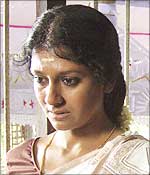|
|
| Help | |
| You are here: Rediff Home » India » Movies » Reviews |
|
 Nandita Das in a still from Naalu Pennungal. | ||
| |||||||||||||||||||||||
|
| |||||||||||||||||||||||
Master director Adoor Gopalakrishnan's Naalu Pennungal (Four Women), which premiered recently at the Masters Section of the Toronto International Film Festival has reached Kerala [Images] theatres.
The thin line between promiscuity and morality, fidelity and desires, and also the clash between wishes and deprivation is what the auteur par excellence tries to explore in Naalu Pennungal. The film is a series of four stories depicting the lives of four females without any direct link to each other. Each of these women comes from different strata of the society, and covers different time spans and changing social milieu.
These four stories adapted from Jnanapith award winner Thakazhi Sivasankara Pillai's short stories are set in verdant Kuttanadu, in an era when social upheaval and turmoil seemed to be settling down. But people are still shocked when individuals made drastic choices. The brilliance of these stories shines through as they happen in the cusp of a change.
The quartet of these stories is set in a chronological order starting from the middle of 1940s to 1960s: from the anarchy of the powers stamping on the rights of nomadic individuals' choice to lead a life of their own, and ending with a lonely individual left in a social structure in form of younger siblings.
The film begins with the story of a prostitute. Two lowly street dwellers Kunju Pennu (Padmapriya) and Pappukutty (Sreejith Ravi) decide to make out a life for themselves as husband and wife. They have bound themselves in matrimony that does not have any legal sanction. So, when law catches up with them, they do not have anything that can be a proof of their commitment towards each other.
The story predictably has an ironical ending where the couple is separated and punished for aspiring to build their future together without any official sanction. But, the sweet gist of the story lies in the portion that shows the intimate relationship between the couple, where they discuss their wage or their dream of having a roof on their heads.
 The Virgin: This is the story of a girl (Geetu Mohandas) who has not shied away from the responsibility of looking after her ageing parents. She works in the paddy fields and has saved enough for her own dowry. Like any responsible parents, her parents too find a good match for her from a neighbouring village. The bridegroom's reputation is very good. He does not have any vices, very hardworking and wise about money. The only weakness of his that we are privy to is that he likes to watch films. He goes to the village theatre every week to see a new film
The Virgin: This is the story of a girl (Geetu Mohandas) who has not shied away from the responsibility of looking after her ageing parents. She works in the paddy fields and has saved enough for her own dowry. Like any responsible parents, her parents too find a good match for her from a neighbouring village. The bridegroom's reputation is very good. He does not have any vices, very hardworking and wise about money. The only weakness of his that we are privy to is that he likes to watch films. He goes to the village theatre every week to see a new film
Here Geetu Mohandas is required to do the minimal as far as performance goes. Nandulal as the bridegroom elicits a few laugh-out-loud moments for the audience as he is presented as a glutton, maybe to convey that something is wrong with him.
The changing phase of the society is depicted when the friends of the bride-to-be demand that the girl should have a look at the prospective groom before disclosing her decision.
The Housewife: Chinnu Amma (Manju Pillai) sees a man passing with an entourage across her window as she is taking a siesta. She is visibly excited by the scene. Next we see her discussing the person with her neighbour. The person is very rich and had left the village at a very young age to prosper. They had mutual affection (or it should be called infatuation) during their school days and it is evident that their liking has not died down with the passage of time.
It is known from their conversation that Chinnu Amma is childless. Her paramour Nara Pillai (Mukesh) suggests that she should try having a relationship outside the wedlock to bear a child. Chinnu seems to give a silent approval for the suggestion. At the last moment she changes her mind, knowing that her husband played by Murali still showers the same affection on her.
We are aware that Chinnu Amma is flirtatious and has a thing for Nara Pillai, still conform to physical fidelity in the marriage.
The Spinster: Kamakshi (Nandita Das) is the eldest of four siblings. She does not seem to be having equal status in the household. Is it because of her dusky complexion or is it because of the fact that she has passed marriage-able age, we are not sure. She always lurks in the fringes never taking the centre-stage. She is busy doing household chores mutely. Even when the boy who has come to see her selects her younger sister played by Kavya Madhavan [Images], it is others who raise their voices.
The story of this character occupies the longest space, but compared to others, this is the meekest of all. This is also the story that remains fresh in our minds long after we leave the theatre, maybe because it is the last one to roll out in the sequence of stories. It is also the most conventional and stereotypical story of the lot.
Kavya Madhavan being the only surprise package as the bewitching beauty who may remind us of Cinderella's step sister.
M J Radhakrishan's cinematography mostly remains static letting the characters play out the scenes instead of prompting them by constant movements.
Adoor Gopalakrishnan's latest offering is a unique experience for the viewers
Rediff Rating: 

|
|
| © 2007 Rediff.com India Limited. All Rights Reserved. Disclaimer | Feedback |